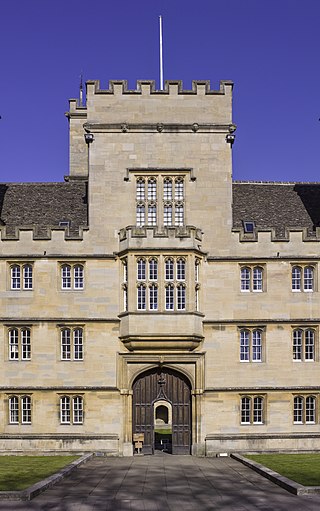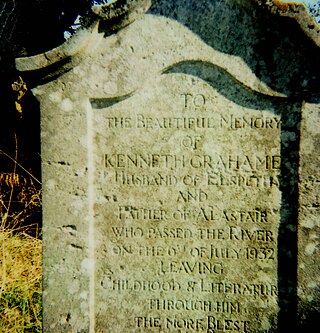Related Research Articles

Regent's Park College is a permanent private hall of the University of Oxford, situated in central Oxford, just off St Giles'.

Trinity College is one of the constituent colleges of the University of Oxford in England. The college was founded in 1555 by Sir Thomas Pope, on land previously occupied by Durham College, home to Benedictine monks from Durham Cathedral.

Wadham College is one of the constituent colleges of the University of Oxford in the United Kingdom. It is located in the centre of Oxford, at the intersection of Broad Street and Parks Road.
The Norway Scholarship is a scholarship to the University of Oxford that is awarded in Norway. Norway Scholars receive funding for one or two years of study and research at Oxford University, and the scholar always becomes a member of Wadham College.

Sir Thomas Graham Jackson, 1st Baronet was one of the most distinguished British architects of his generation. He is best remembered for his work at Oxford, including the Oxford Military College at Cowley, the university's Examination Schools, most of Hertford College, much of Brasenose College, ranges at Trinity College and Somerville College, the City of Oxford High School for Boys, and the Acland Nursing Home.

Diarmaid Ninian John MacCulloch is an English academic and historian, specialising in ecclesiastical history and the history of Christianity. Since 1995, he has been a fellow of St Cross College, Oxford; he was formerly the senior tutor. Since 1997, he has been Professor of the History of the Church at the University of Oxford.

Holywell Cemetery is next to St Cross Church in Oxford, England. The cemetery is behind the church in St Cross Road, south of Holywell Manor on Manor Road and north of Longwall Street, in the parish of Holywell.

St Sepulchre's Cemetery is a former cemetery located on Walton Street, Jericho, central Oxford, England.

Max Beloff, Baron Beloff, was a British historian and Conservative peer. From 1974 to 1979 he was principal of the University College of Buckingham, now the University of Buckingham.
Sir David Stephen Eastwood,, is a British academic and long serving university leader who was Vice-Chancellor of the University of Birmingham between 13 April 2009 and December 2021.
William Arnold was an important master mason in Somerset, England.

Nicholas Wadham (1531–1609) of Merryfield in the parish of Ilton, Somerset, and Edge in the parish of Branscombe, Devon, was a posthumous co-founder of Wadham College, Oxford, with his wife Dorothy Wadham who, outliving him, saw the project through to completion in her late old age. He was Sheriff of Somerset in 1585.
Richard Sharpe,, Hon. was a British historian and academic, who was Professor of Diplomatic at the University of Oxford and a fellow of Wadham College, Oxford. His broad interests were the history of medieval England, Ireland, Scotland and Wales. He had a special concern with first-hand work on the primary sources of medieval history, including the practices of palaeography, diplomatic and the editorial process, as well as the historical and legal contexts of medieval documents. He was the general editor of the Corpus of British Medieval Library Catalogues, and editor of a forthcoming edition of the charters of King Henry I of England.
Richard Barrie Dobson, was an English historian, who was a leading authority on the legend of Robin Hood as well as a scholar of ecclesiastical and Jewish history. He served as Professor of Medieval History at the University of Cambridge from 1988 to 1999.

Harris Manchester College (HMC) is one of the constituent colleges of the University of Oxford in the United Kingdom. It was founded in Warrington in 1757 as a college for Unitarian students and moved to Oxford in 1893. It became a full college of the university in 1996, taking its current name to commemorate its predecessor the Manchester Academy and a benefaction by Lord Harris of Peckham.
Ernest Wilson Nicholson, was a British scholar of the Old Testament and Church of England priest. He was Oriel Professor of the Interpretation of Holy Scripture at the University of Oxford from 1979 to 1990 and served as Provost of Oriel College, Oxford, from 1990 to 2003.

The following is a timeline of the history of the city, university and colleges of Oxford, England.
Vincent Gillespie, FEA is Emeritus J. R. R. Tolkien Professor of English Literature and Language at the University of Oxford. He was editor of the Exeter Medieval Texts and Studies Series from 2002 until 2023, and was the Honorary Director of the Early English Text Society from 2013 until 2023, having previously served as its Executive Secretary from 2004 until 2013. His major research area is late medieval English literature. He has published over sixty articles and book chapters ranging from medieval book history, through Geoffrey Chaucer and William Langland, to the medieval mystics such as Richard Rolle and, most recently, Julian of Norwich. He has a special interest in the medieval English Carthusians, and in Syon Abbey, the only English house of the Birgittine order. In 2001, he published Syon Abbey, Corpus of British Medieval Library Catalogues 9, an edition and analysis of the late-medieval library registrum of the Birgittine brethren of Syon Abbey. He is the author of Looking in Holy Books, and the forthcoming A Short History of Medieval English Mysticism. He is the co-editor, with Kantik Ghosh, of After Arundel: Religious Writing in Fifteenth-Century England, with Susan Powell of A Companion to the Early Printed Book in Britain, 1476-1558, with Samuel Fanous of The Cambridge Companion to Medieval English Mysticism, and with Anne Hudson of Probable Truth: Editing Medieval Texts from Britain in the Twenty-First Century.
Clare Victoria Joanne Griffiths, FRHistS, is a historian and academic. Since 2016, she has held the Chair in Modern History at Cardiff University.
References
- 1 2 3 Crockford's Clerical Directory 2016–17 (London: Church House Publishing, 2016), p. 963.
- 1 2 William Whyte, Unlocking the Church: The Lost Secrets of Victorian Sacred Space (Oxford: Oxford University Press, 2017), p. x.
- ↑ Oxford Today (University of Oxford, October 2013), p. 35.
- ↑ Tim Healey, "Architect of dreaming spires", The Oxford Mail, 25 May 2007. Retrieved 23 February 2018.
- ↑ "Notices", University of Oxford Gazette, 13 November 1997. Retrieved 23 February 2018.
- ↑ "Notices", University of Oxford Gazette, 25 September 1997. Retrieved 23 February 2018.
- ↑ "Elections", University of Oxford Gazette, 2 June 2011 (vol. 141, no. 4955). Retrieved 23 February 2018.
- ↑ "Oxford Jackson: architecture, education, status and style, 1835–1924", EthOS (British Library). Retrieved 23 February 2018.
- ↑ "Reverend Professor William Whyte", St John's College, Oxford. Retrieved 23 February 2018.
- ↑ "Recognition of Distinction: Successful applicants 2014", University of Oxford Gazette, no. 5076, 6 November 2014. Retrieved 20 November 2016.
- ↑ News, St John’s College, Oxford, 27 January 2023
- 1 2 3 "Clergy", St Peter's Wolvercote. Retrieved 23 February 2018.
- ↑ "Zoe Waxman", Faculty of Oriental Studies, University of Oxford. Retrieved 23 February 2018.
- ↑ "Professor William Whyte", University of Oxford. Retrieved 23 February 2018.
- ↑ "Professor William Whyte: List of Publications", University of Oxford. Retrieved 23 February 2013.